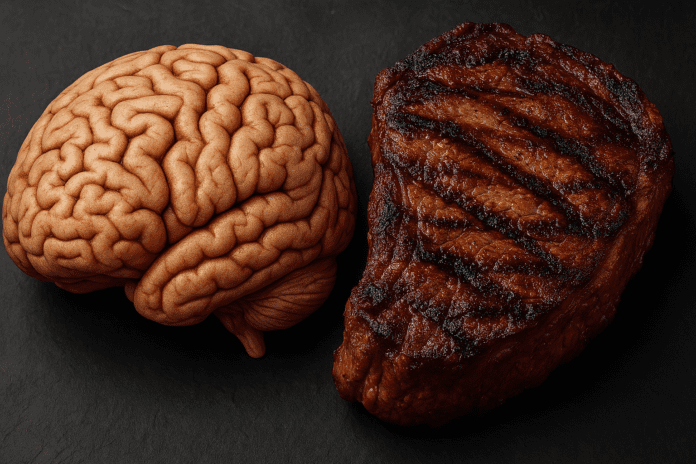In the modern era of dietary experimentation, the carnivore diet has gained increasing traction among individuals seeking alternative approaches to health optimization. Promoted for its simplicity and the elimination of plant-based foods, this diet primarily centers on the consumption of animal products, with red meat often serving as its cornerstone. As interest in the potential health benefits and risks of such dietary regimens grows, a particularly pressing question has emerged: Can a carnivore diet influence the risk of developing Alzheimer’s disease? This inquiry is not merely theoretical; it strikes at the heart of two of today’s most critical health concerns—cognitive decline and dietary intervention.
Within the broader conversation surrounding brain health, few subjects have drawn as much attention as Alzheimer’s disease. Characterized by the progressive deterioration of memory, thinking, and behavior, Alzheimer’s is both a medical mystery and a public health crisis. Researchers are increasingly examining modifiable lifestyle factors that might influence disease onset or progression, and diet stands out as a particularly potent variable. As such, the relationship between alzheimers on carnivore diet and overall cognitive wellness demands rigorous scrutiny.
You may also like: How to Prevent Dementia and Alzheimer’s Disease Naturally: Expert-Backed Strategies to Reduce Your Risk Through Lifestyle and Diet
Understanding Alzheimer’s Disease and Dietary Implications
Alzheimer’s disease, the most common form of dementia, affects millions of individuals worldwide and poses immense challenges for caregivers and healthcare systems alike. While the precise etiology of Alzheimer’s remains elusive, the accumulation of beta-amyloid plaques, tau protein tangles, oxidative stress, and neuroinflammation are widely recognized as hallmark features of the condition. Genetic predispositions, such as the presence of the APOE-e4 allele, undoubtedly play a role, but mounting evidence suggests that lifestyle choices—particularly diet—can influence disease risk.
Historically, the Mediterranean and DASH (Dietary Approaches to Stop Hypertension) diets have received attention for their neuroprotective properties, owing to their emphasis on fruits, vegetables, whole grains, and healthy fats. In contrast, the carnivore diet eschews plant-based nutrients entirely, focusing instead on high-fat, moderate-protein animal products. Proponents argue that this dietary approach reduces inflammation, improves insulin sensitivity, and eliminates potentially harmful plant antinutrients. However, skeptics raise concerns about long-term nutrient deficiencies, microbiome disruption, and the impact of excessive red meat consumption on brain health.
Alzheimers on carnivore diet has thus become a focal point for researchers exploring non-traditional nutritional frameworks. The stakes are high, as any insights into dietary modulation of Alzheimer’s risk could inform both preventative strategies and therapeutic interventions.
Red Meat and Cognitive Function: What Does the Science Say?
The role of red meat in the context of Alzheimer’s disease is complex and multifaceted. On one hand, red meat provides essential nutrients that support cognitive function, including iron, zinc, vitamin B12, and high-quality protein. These nutrients are critical for maintaining the structural integrity of neurons, supporting neurotransmitter synthesis, and preserving overall brain health. Some studies have even suggested that moderate red meat consumption may contribute to improved cognitive performance in older adults, particularly when included in balanced, nutrient-rich diets.
On the other hand, excessive consumption of red and processed meats has been associated with increased oxidative stress, systemic inflammation, and vascular dysfunction—factors known to exacerbate neurodegeneration. Moreover, epidemiological studies have linked high red meat intake with elevated levels of homocysteine, a biomarker implicated in cognitive decline and dementia. These findings have led to cautionary statements from major health organizations, warning against diets disproportionately high in red and processed meats.
When evaluating the keyword phrase alzheimer red meat, it becomes evident that the association is far from clear-cut. Contextual factors such as meat quality, preparation methods, portion sizes, and overall dietary patterns significantly modulate the potential impact of red meat on brain health. Grass-fed, unprocessed meats consumed in moderation may have very different effects compared to heavily processed, nitrate-laden alternatives consumed in excess.
The Carnivore Diet: Metabolic and Neurological Considerations
Proponents of the carnivore diet often emphasize its role in correcting metabolic dysfunction, which has been increasingly linked to neurodegenerative diseases. Insulin resistance, for instance, is not only a hallmark of type 2 diabetes but also a contributing factor in Alzheimer’s pathology. Some researchers have even referred to Alzheimer’s as “type 3 diabetes” due to its strong correlation with impaired glucose metabolism in the brain.
By eliminating carbohydrates entirely, the carnivore diet induces a state of ketosis, wherein the body relies on ketone bodies rather than glucose for energy. Ketones have been shown to provide neuroprotective benefits, including enhanced mitochondrial function, reduced oxidative stress, and improved cognitive performance in some populations. Early studies investigating ketogenic interventions in Alzheimer’s patients have demonstrated modest cognitive improvements, particularly in individuals with mild cognitive impairment.
This raises a critical question: Could Alzheimer’s on carnivore diet reflect a broader therapeutic strategy targeting metabolic pathways? Advocates suggest that by eliminating insulin-spiking foods and simplifying dietary inputs, the carnivore approach allows the brain to operate more efficiently on an alternative fuel source. Nonetheless, the absence of plant-derived polyphenols, antioxidants, and fiber may negate some of these benefits, and the long-term consequences of such dietary restriction remain poorly understood.

Inflammation, Gut-Brain Axis, and the Carnivore Diet
Neuroinflammation is a recognized driver of Alzheimer’s progression, and diet plays a central role in modulating inflammatory pathways. While anti-inflammatory diets typically emphasize a diverse range of plant foods, omega-3-rich fish, and moderate intake of red wine, the carnivore diet presents a radically different profile. Rich in saturated fats and devoid of dietary fiber, this regimen alters gut microbiota composition and may impact the gut-brain axis—a bidirectional communication network linking the gastrointestinal tract and the central nervous system.
Emerging research on the gut-brain axis highlights the importance of microbial diversity in maintaining cognitive resilience. Fiber-rich diets promote the growth of beneficial bacteria that produce short-chain fatty acids (SCFAs), compounds that possess anti-inflammatory and neuroprotective properties. In the absence of dietary fiber, as is the case with a strict carnivore diet, SCFA production is significantly diminished. This shift could potentially disrupt the gut-brain axis, leading to increased systemic inflammation and compromised blood-brain barrier integrity.
Despite these concerns, some carnivore diet advocates report subjective improvements in mental clarity, reduced brain fog, and enhanced emotional stability. These anecdotal reports have yet to be substantiated through rigorous, long-term clinical trials. The complex interplay between Alzheimer red meat intake and microbiome-mediated inflammation remains a fertile ground for future investigation.
Genetic and Epigenetic Interactions: Diet and Cognitive Risk
Alzheimer’s disease is deeply influenced by genetic predispositions, but emerging research suggests that environmental and lifestyle factors can modulate gene expression through epigenetic mechanisms. Nutrients found in red meat, such as choline, methionine, and B vitamins, are involved in one-carbon metabolism—a biochemical pathway that influences DNA methylation and gene regulation. Adequate intake of these nutrients supports cognitive health, particularly in aging populations.
However, excessive red meat consumption may also exacerbate genetic vulnerabilities, especially in individuals carrying the APOE-e4 allele. Some studies have shown that diets high in saturated fats and cholesterol can amplify the risk of cognitive decline in genetically susceptible individuals. Understanding how Alzheimer’s on carnivore diet interacts with an individual’s genetic makeup could pave the way for personalized dietary recommendations.
Moreover, gender differences may further complicate the picture. Women are disproportionately affected by Alzheimer’s, and their hormonal milieu influences both brain metabolism and dietary responsiveness. As such, the impact of red meat-heavy diets on female cognitive health may differ from that observed in men, necessitating sex-specific research protocols in future studies.
Nutritional Deficiencies and the Brain: Risks of Dietary Restriction
The exclusion of plant foods in the carnivore diet raises legitimate concerns about potential micronutrient deficiencies. While red meat is an excellent source of certain nutrients, it lacks others that are vital for brain health, including vitamin C, magnesium, potassium, and plant-based polyphenols. These compounds play important roles in antioxidant defense, neurotransmission, and vascular function.
Alzheimer’s patients often exhibit deficiencies in several micronutrients, and suboptimal intake may accelerate cognitive decline. For instance, vitamin C is not only an antioxidant but also a cofactor in neurotransmitter synthesis. Magnesium modulates NMDA receptor activity, a critical aspect of synaptic plasticity and memory formation. By omitting fruits, vegetables, and whole grains, the carnivore diet may inadvertently deprive the brain of essential neuroprotective compounds.
Nonetheless, some advocates argue that the bioavailability of nutrients in animal-based foods compensates for the lack of plant-derived nutrients. They contend that the highly absorbable forms of iron, zinc, and B vitamins found in red meat confer unique cognitive benefits. This perspective contributes to the nuanced debate around alzheimer red meat implications and highlights the need for individualized nutritional assessments.
Clinical Evidence, Anecdotes, and the Need for Rigorous Research
Despite growing interest in the carnivore diet, high-quality clinical trials examining its long-term impact on brain health are scarce. Much of the available evidence is either anecdotal or extrapolated from studies on ketogenic diets, which, while similar in some respects, typically include plant-based fats and low-glycemic vegetables. The existing scientific literature on Alzheimer’s on carnivore diet remains fragmented and inconclusive.
Personal testimonials often cite improved mental clarity, stabilized mood, and better memory on the carnivore diet. However, self-reported outcomes lack the objectivity and rigor required for medical endorsement. Placebo effects, dietary novelty, and lifestyle confounders may contribute to perceived cognitive improvements. Without randomized, controlled trials comparing the carnivore diet to other dietary interventions, definitive conclusions about its effects on Alzheimer’s risk cannot be drawn.
That said, the burgeoning interest in ancestral diets, metabolic health, and low-carbohydrate therapies suggests a fertile landscape for future investigation. Researchers must prioritize long-term studies that examine not only cognitive outcomes but also cardiovascular health, inflammation markers, metabolic parameters, and microbiome composition.
Public Health Implications and Ethical Considerations
The implications of promoting or discouraging red meat consumption extend beyond individual health outcomes to include environmental sustainability and ethical considerations. Livestock farming contributes significantly to greenhouse gas emissions, and widespread adoption of carnivore diets could exacerbate ecological challenges. Moreover, cultural and socioeconomic factors influence dietary choices, access to quality meats, and healthcare literacy.
Public health recommendations must therefore strike a delicate balance between individual autonomy, scientific evidence, and societal impact. While some individuals may experience cognitive benefits from reducing carbohydrate intake or increasing protein consumption, broad endorsement of the carnivore diet remains premature. A more nuanced approach—one that considers genetic predisposition, metabolic health, and cultural context—is essential for crafting responsible dietary guidelines.

FAQ: Can a Carnivore Diet Influence Alzheimer’s Risk? Exploring Expert Insights on Red Meat and Brain Health
1. How does a carnivore diet influence brain-derived neurotrophic factor (BDNF), and why might this matter for Alzheimer’s risk?
While the main article touches on general metabolic and inflammatory pathways, one emerging area of interest is how diet affects brain-derived neurotrophic factor (BDNF). BDNF plays a crucial role in maintaining synaptic plasticity, learning, and memory formation. There is early evidence suggesting that high-fat, low-carb diets—including ketogenic and carnivore diets—can increase BDNF levels. This could theoretically support cognitive resilience in individuals at risk of Alzheimer’s. For those exploring the potential of managing Alzheimer’s on carnivore diet frameworks, understanding how BDNF responds to animal-based nutrition could inform more targeted interventions.
2. Can red meat impact the function of mitochondria in brain cells, and what are the implications for Alzheimer’s?
Red meat contains nutrients like CoQ10, carnitine, and creatine, all of which support mitochondrial function. Mitochondrial decline is a hallmark of aging and Alzheimer’s pathology. By supporting cellular energy production, red meat might indirectly help maintain brain vitality. However, excessive intake, especially of processed meat, could counteract these benefits through oxidative stress. Balancing the intake of red meat within a carnivore diet may be important when considering the long-term implications of Alzheimer red meat relationships on cellular health.
3. How might social and psychological factors related to strict carnivore eating patterns influence Alzheimer’s outcomes?
Beyond nutrition, the psychosocial elements of strict diets are often overlooked. Adhering to a carnivore diet can lead to social isolation, especially in cultures that emphasize communal, plant-rich meals. Social engagement is a known protective factor against cognitive decline. For individuals pursuing Alzheimer’s on carnivore diet protocols, it is important to assess not just biological effects but also the mental health consequences of rigid eating patterns. Maintaining social interaction and flexibility can mitigate these risks.
4. What role does heme iron from red meat play in brain aging and dementia risk?
Heme iron, abundant in red meat, is more bioavailable than plant-based iron. While iron is essential for neurotransmitter synthesis and myelin production, too much can contribute to oxidative stress in the brain. Studies have shown that elevated brain iron levels may be linked to neurodegeneration. Thus, alzheimer red meat discussions must include considerations of iron metabolism, especially in individuals with genetic predispositions that impair iron regulation. Monitoring ferritin levels might be advisable for those on long-term carnivore diets.
5. Could the exclusion of plant-based foods in a carnivore diet lead to deficiencies that influence Alzheimer’s progression?
Absolutely. Many phytonutrients found in plants, such as flavonoids and carotenoids, have been shown to protect brain cells from oxidative damage. Their absence may reduce the body’s ability to counteract age-related inflammation. While red meat supplies some antioxidants like carnosine and taurine, they do not fully replace the spectrum found in colorful fruits and vegetables. Therefore, discussions about Alzheimer’s on carnivore diet strategies must weigh the cognitive risks of excluding plant-derived antioxidants. Some carnivore diet adherents supplement with isolated polyphenols, though this is still experimental.
6. Are there any notable differences in how men and women might respond to red meat-heavy diets in the context of Alzheimer’s?
Yes, hormonal differences can significantly influence dietary responses. For instance, estrogen plays a role in lipid metabolism and inflammation, potentially making postmenopausal women more vulnerable to high saturated fat intake. Since women already have a higher lifetime risk of Alzheimer’s, the implications of Alzheimer red meat consumption may differ by sex. Personalized nutrition approaches should take into account hormonal status, metabolic history, and even menopause when designing carnivore-based interventions. Future research needs to be more inclusive of these variables.
7. How does the carnivore diet impact sleep quality and circadian rhythms, and why does this matter for Alzheimer’s?
Sleep quality is intimately tied to brain detoxification processes that clear beta-amyloid proteins. Anecdotal reports suggest some individuals experience better sleep on a carnivore diet, likely due to blood sugar stabilization. However, others report sleep disturbances, possibly linked to disrupted serotonin production in the absence of plant carbohydrates. Because poor sleep is a major risk factor for Alzheimer’s, any exploration of Alzheimer’s on carnivore diet approaches must include sleep monitoring. Adjusting meal timing and macronutrient ratios may help optimize sleep-related outcomes.
8. How might red meat from different sources (e.g., grass-fed vs. grain-fed) affect brain health differently?
Not all red meat is nutritionally equal. Grass-fed meat tends to have higher omega-3 fatty acid content and more antioxidants like vitamin E, which may counteract inflammation. Grain-fed meat, by contrast, has a higher omega-6 to omega-3 ratio, potentially promoting pro-inflammatory states. In considering Alzheimer red meat connections, the source and quality of the meat are crucial variables. Selecting pasture-raised, minimally processed meats can tip the scales toward more favorable cognitive outcomes.
9. Can short-term carnivore dieting be used strategically in cognitive rehab or recovery programs?
Some experimental protocols have considered short-term dietary ketosis as a metabolic reset for individuals with mild cognitive impairment. While a full carnivore diet may be too extreme for long-term use, its ability to induce rapid ketosis could have short-term utility in clinical settings. For those exploring Alzheimer’s on carnivore diet therapeutics, such applications would require close medical supervision and nutrient monitoring. The goal would be metabolic flexibility rather than rigid long-term adherence.
10. What is the potential future role of red meat in precision nutrition for neurodegenerative disease prevention?
As precision medicine advances, we may see more individualized dietary prescriptions that include or exclude red meat based on genetic markers, microbiome profiles, and metabolic biomarkers. For example, someone with a high need for vitamin B12 and robust iron metabolism might benefit from moderate red meat intake. Conversely, another with pro-inflammatory SNPs might be better off limiting it. Therefore, alzheimer red meat considerations in clinical nutrition are likely to become more nuanced and personalized rather than dogmatic. Precision tools may help optimize both safety and efficacy of such interventions.

Conclusion: Weighing the Complexities of Alzheimer Red Meat Connections in a Carnivore Context
As the scientific community continues to unravel the intricate relationships between diet and cognitive function, the question of whether a carnivore diet can influence Alzheimer’s risk remains unresolved but deeply compelling. The discussion around Alzheimer’s on carnivore diet sits at the intersection of metabolic health, neurobiology, nutrition science, and individual variability. While some elements of the carnivore approach—notably its ability to reduce insulin resistance and provide high-quality animal nutrients—offer theoretical cognitive benefits, other aspects—including potential micronutrient deficiencies and microbiome disruption—raise significant concerns.
The link between Alzheimer red meat consumption and cognitive decline is likewise multifactorial, shaped by the type and amount of meat consumed, genetic background, lifestyle habits, and overall dietary patterns. Until more comprehensive, controlled research becomes available, caution and personalization should guide dietary decisions, especially for individuals at elevated risk for Alzheimer’s disease.
Ultimately, the carnivore diet represents a provocative frontier in nutritional science. Its potential to impact cognitive health warrants serious investigation, but it must be approached with the same rigor and nuance applied to more conventional dietary models. For now, maintaining a balanced, nutrient-dense diet that aligns with individual health needs and emerging scientific evidence remains the most prudent course for those concerned about Alzheimer’s prevention and cognitive longevity.
low carb brain health, ketogenic diet and memory, meat-based diet and cognition, neurodegenerative diet strategies, brain inflammation and diet, cognitive decline nutrition, insulin resistance and dementia, high fat diet brain effects, animal protein and memory, diet and amyloid plaques, neuroprotective nutrients, dementia and metabolic health, ketosis and brain function, nutrition for aging brain, cognitive resilience diet, memory and gut health, diet and neuroplasticity, meat nutrients for brain, Alzheimer’s dietary prevention, brain-boosting nutrition
Further Reading:
Meat consumption and risk of incident dementia: cohort study of 493,888 UK Biobank participants
Eating greater quantities of red meat may increase risk of dementia
Diets play a major role in reducing the risk of Alzheimer’s disease
Disclaimer
The information contained in this article is provided for general informational purposes only and is not intended to serve as medical, legal, or professional advice. While Health11News strives to present accurate, up-to-date, and reliable content, no warranty or guarantee, expressed or implied, is made regarding the completeness, accuracy, or adequacy of the information provided. Readers are strongly advised to seek the guidance of a qualified healthcare provider or other relevant professionals before acting on any information contained in this article. Health11News, its authors, editors, and contributors expressly disclaim any liability for any damages, losses, or consequences arising directly or indirectly from the use, interpretation, or reliance on any information presented herein. The views and opinions expressed in this article are those of the author(s) and do not necessarily reflect the official policies or positions of Health11News.


